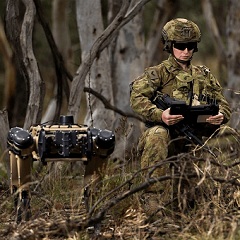The United States Department of Homeland Security has detailed ongoing work with its Science and Technology Directorate exploring the use of quadruped dog robots on the nation’s southern border. Specifically, the department is deploying these Spot-like robots to patrol stretches that might otherwise be inhospitable to human agents.
“The southern border can be an inhospitable place for man and beast, and that is exactly why a machine may excel there,” the DHS’s Brenda Long said in a statement tied to the news. “This S&T-led initiative focuses on Automated Ground Surveillance Vehicles, or what we call ‘AGSVs.’ Essentially, the AGSV program is all about…robot dogs.”
The program is partnering with Ghost Robots, a Philadelphia-based firm that has, in the past, worked with large corporations like Verizon. More recently the company made headlines when one of its robots was seen sporting a remote-controlled sniper rifle (SWORD Defense Systems Special Purpose Unmanned Rifle or SPUR) at a trade show. It’s a line that the best-known quadrupedal robotics firm, Boston Dynamics, hasn’t been willing to cross, despite earlier conversations with DARPA.
The stated use for these robots on the border is patrolling. The systems can wander autonomously or be controlled remotely, sending live video feeds to operators. There’s certainly no indication here that these robots would be equipped with any sort of weapons systems of course, in spite of that being the thing that put the company on many people’s radar.
For its part, Ghost says it proudly partners with the U.S. government and takes a largely agnostic approach to things like payload. “We don’t make the payloads. Are we going to promote and advertise any of these weapon systems? Probably not,” CEO Jiren Parikh said. “That’s a tough one to answer. Because we’re selling to the military, we don’t know what they do with them. We’re not going to dictate to our government customers how they use the robots. We do draw the line on where they’re sold. We only sell to U.S. and allied governments. We don’t even sell our robots to enterprise customers in adversarial markets. We get lots of inquiries about our robots in Russia and China. We don’t ship there, even for our enterprise customers.”








